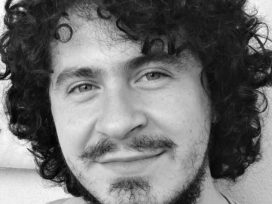The rapid pace of change in Chinese urban landscapes has led to a resurge in interest in the architectural heritage of the “bourgeois era”. The Hungarian architect László Hudec, best known for the Grand Hotel in Shanghai (1931-34), is being rediscovered as a pioneer of Chinese modernism. János Gerle recalls the life and work of the technical and stylistic virtuouso.
Articles
Read more than 6000 articles in 35 languages from over 90 cultural journals and associates.
The stranger, the mother and the Algerian revolution
A postcolonial reading of Albert Camus
The purely existential themes of The Stranger hide Camus’ critique of the discriminatory nature of French rule in Algeria. Yet Camus never entirely renounced the civilizing premise of colonialism. The reason lies in his relation to his mother, writes Michael Azar.
"Why did they need to chop down the trees?"
An interview with Mavis Gallant
As an ex patriot in Paris, Canadian novelist Mavis Gallant experienced May ’68 first hand, keeping a diary of the events that was published two decades later as Paris Notebooks. In interview with her Russian translator, she bemusedly recalls the revolutionary fervour of the day.

Attempts by successive French governments to deal with Roma migrants smacks of colonial racism, argues Valeriu Nicolae. Deportation will not solve anything; the problems that exist in Roma settlements is the result of decades of neglect, indifference and underfunding.

What is the difference between voluntary and involuntary self-revelation online? Is the regulation of Internet privacy a matter for the state, or must the web community negotiate its own privacy norms and strategies? A conversation between a happy connoisseur and a doubting neophyte.
The climate justice position is necessary but not sufficient for comprehending the current crisis, writes Dipesh Chakrabarty. As a geophysical force, the human species wields a new kind of agency unaccounted for in familiar narratives of the history of capitalist growth.
Daniel Barenboim talks in interview about why the taboo on performing Wagner has no place in Israel today, and why openness towards the other, the founding principle of the West-Eastern Divan Orchestra, continues to be relevant across the Middle East.
“Multiculturalism undermines the very opportunity that diversity offers: to enter into a dialogue about citizenship.” In the fifth debate in Eurozine’s series “Europe talks to Europe”, Kenan Malik and Fero Sebej discussed an issue back at the top of the European political agenda.
Utopian designs for the ideal society are both impractical and dangerous. Only by finding the right balance between the “holy trinity” of the French Revolution may the world steer its way through the challenges of libertarianism and laissez faire, writes Rein Müllerson.
Rather than concede the unpopularity of the wars in Iraq and Afghanistan, the British government has retreated to higher ground to persuade the electorate of its patriotic duties, writes Vron Ware. A language of sacrifice and heroism serves to exclude those who oppose the wars.
"Dear Hannah Arendt..."
Correspondence between Leni Yahil and Hannah Arendt, 1961-1971
When Hannah Arendt went to Jerusalem in the spring of 1961 to observe the Eichmann trial, she befriended Leni Yahil, a German-born historian and Holocaust researcher. They began a correspondence that alternates between personal, philosophical and political issues. In 1963, after the publication of Arendt’s articles on the Eichmann trials, it ended abruptly. Yahil’s attempt to revive the correspondence eight years later failed: their friendship did not withstand the “Arendt controversy”.
What counts is the music
Mieczyslaw Weinberg's life and work
A friend of Shostakovich and one of the great composers of his era, how did Mieczyslaw Weinberg get so lost? His biographer explains not only how Weinberg disappeared from view, but why we must listen to his work.
What is it good for? A passing fad! It makes you stupid! Today’s technology critique is tomorrow’s embarrassing error of judgement, as Katrin Passig shows. Her suggestion: one should try to avoid repeating the most commonplace critiques, particularly in public.
A bitter battle is underway between the supporters of intellectual property and those who defend the notion of the commons. Legal historian Mikhail Xifaras traces the history of the concept of “exclusive rights” and evaluates the emancipatory claims of the copyleft movement today.
The marketization of the media combines with digital media technology to create a political order determined by public opinion. For political decision-making, the question whether opinion is right or wrong becomes secondary to its legitimacy as a form of feedback.
Contesting the origins of European liberty
The EU narrative of Franco-German reconciliation and the eclipse of 1989
Despite western Europe’s initially lukewarm response to the people’s revolutions of ’89, twenty years on the EU claims them as a cornerstone of “European identity”. Yet historical gaffes have exposed the pitfalls in attempting to create an all too tidy narrative of Europe’s twentieth century, writes Stefan Auer.